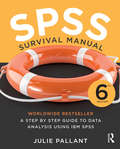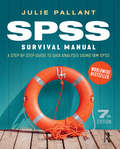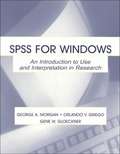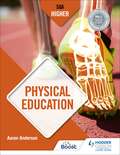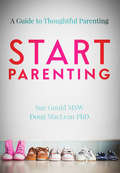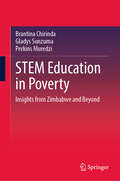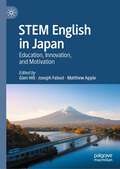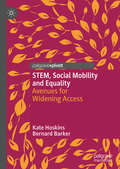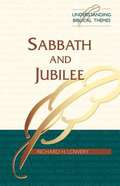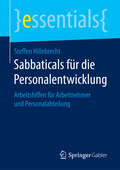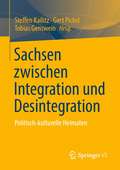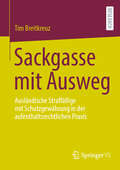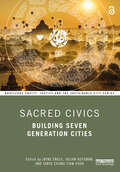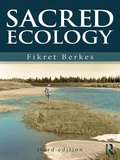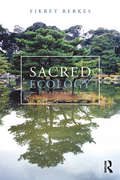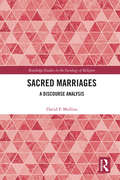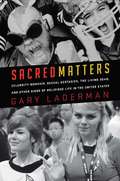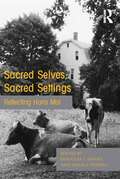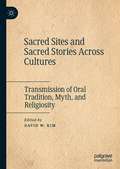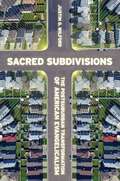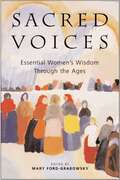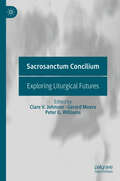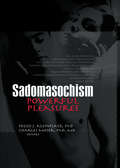- Table View
- List View
SPSS Survival Manual: A step by step guide to data analysis using IBM SPSS
by Julie PallantThe SPSS Survival Manual throws a lifeline to students and researchers grappling with this powerful data analysis software.In her bestselling guide, Julie Pallant guides you through the entire research process, helping you choose the right data analysis technique for your project. From the formulation of research questions, to the design of the study and analysis of data, to reporting the results, Julie discusses basic and advanced statistical techniques. She outlines each technique clearly, with step-by-step procedures for performing the analysis, a detailed guide to interpreting data output and an example of how to present the results in a report.For both beginners and experienced users in psychology, sociology, health sciences, medicine, education, business and related disciplines, the SPSS Survival Manual is an essential text. Illustrated with screen grabs, examples of output and tips, it is supported by a website with sample data and guidelines on report writing.This sixth edition is fully revised and updated to accommodate changes to IBM SPSS procedures, screens and output. It covers new SPSS tools for generating graphs and non- parametric statistics, importing data, and calculating dates.'An excellent introduction to using SPSS for data analysis. It provides a self-contained resource itself, with more than simply (detailed and clear) step-by-step descriptions of statistical procedures in SPSS. There is also a wealth of tips and advice, and for each statistical technique a brief, but consistently reliable, explanation is provided.' - Associate Professor George Dunbar, University of Warwick'This book is recommended as ESSENTIAL to all students completing research projects - minor and major.' - Dr John Roodenburg, Monash University
SPSS Survival Manual: A step by step guide to data analysis using IBM SPSS
by Julie PallantThe SPSS Survival Manual throws a lifeline to students and researchers grappling with this powerful data analysis software.In her bestselling manual, Julie Pallant guides you through the entire research process, helping you choose the right data analysis technique for your project. From the formulation of research questions, to the design of the study and analysis of data, to reporting the results, Julie discusses basic through to advanced statistical techniques. She outlines each technique clearly, providing step by step procedures for performing your analysis, a detailed guide to interpreting data output and examples of how to present your results in a report.For both beginners and experienced users in psychology, sociology, health sciences, medicine, education, business and related disciplines, the SPSS Survival Manual is an essential text. Illustrated with screen grabs, examples of output and tips, it is supported by a website with sample data and guidelines on report writing.This seventh edition is fully revised and updated to accommodate changes to IBM SPSS Statistics procedures, screens and output. 'An excellent introduction to using SPSS for data analysis. It provides a self-contained resource itself, with more than simply (detailed and clear) step-by-step descriptions of statistical procedures in SPSS. There is also a wealth of tips and advice, and for each statistical technique a brief, but consistently reliable, explanation is provided.' - Associate Professor George Dunbar, University of Warwick'This book is recommended as ESSENTIAL to all students completing research projects - minor and major.' - Dr John Roodenburg, Monash UniversityA website with support materials for students and lecturers is available at www.spss.allenandunwin.com
SPSS for Windows: An Introduction to Use and Interpretation in Research
by George A. Morgan Orlando V. Griego Gene GloecknerA supplementary textbook for a graduate or undergraduate introductory course in research methods or statistics in the behavioral sciences or education. Morgan (education and human development, Colorado State U.), Orlando V. Griego (business and management, Azusa Pacific U.), and Gene W. Gloeckner (education, Colorado State U.) help students learn how to analyze and interpret research data using the Statistical Products and Service Solutions statistical software package in a Microsoft Windows environment. No background in statistics is assumed. The disk contains data files for the laboratory exercises. Annotation c. Book News, Inc., Portland, OR (booknews.com)
SQA Higher Physical Education
by Aaron AndersonExam board: SQALevel: HigherSubject: Physical EducationFirst teaching: September 2018First exams: Summer 2019Perform to the very best of your ability in Higher PE as you master the theory and overcome the challenges of the exam.This highly visual textbook contains dozens of diagrams that make it easier to understand and remember the content.> Be guided through each area of the course. All the mandatory knowledge, skills and specification points are structured into a logical sequence for students and teachers> Get to grips with the command words. Find out what each of the five command words is asking you to do and then use the strategies provided to answer questions across each area of the course> Learn through practice. Enjoy an active approach to theory, applying and developing your knowledge through lots of dynamic and varied tasks, rather than lots of reading> Feel confident about the exam. Tips throughout the book explain how to answer questions effectively. End-of-chapter exam-style questions and two practice papers help you to revise and prepare for the exam> Check your understanding. Over 30 pages of detailed answers for all tasks, exam-style questions and practice papers are included at the back of the book, to support independent learningThe book concludes with a special chapter for teachers, which provides ideas for fun, interactive teaching strategies that are based on the latest pedagogical research into retrieval practice, cooperative learning and active learning.
SQA Higher Physical Education
by Aaron AndersonExam board: SQALevel: HigherSubject: Physical EducationFirst teaching: September 2018First exams: Summer 2019Perform to the very best of your ability in Higher PE as you master the theory and overcome the challenges of the exam.This highly visual textbook contains dozens of diagrams that make it easier to understand and remember the content.> Be guided through each area of the course. All the mandatory knowledge, skills and specification points are structured into a logical sequence for students and teachers> Get to grips with the command words. Find out what each of the five command words is asking you to do and then use the strategies provided to answer questions across each area of the course> Learn through practice. Enjoy an active approach to theory, applying and developing your knowledge through lots of dynamic and varied tasks, rather than lots of reading> Feel confident about the exam. Tips throughout the book explain how to answer questions effectively. End-of-chapter exam-style questions and two practice papers help you to revise and prepare for the exam> Check your understanding. Over 30 pages of detailed answers for all tasks, exam-style questions and practice papers are included at the back of the book, to support independent learningThe book concludes with a special chapter for teachers, which provides ideas for fun, interactive teaching strategies that are based on the latest pedagogical research into retrieval practice, cooperative learning and active learning.
START Parenting: A Guide to Thoughtful Parenting
by Doug Maclean Sue Gould MswParents/Carers- What are You Doing? What are your Kids Doing ? Bringing up Kids is a Tough Call. S.T.A.R.T. is a new, unique strategy to help put you back in the driver’s seat. The S.T.A.R.T. Strategy is based on sound theory, knowledge and practical experience from two highly skilled psychologists/social workers/counsellors/educators. Their approach is down-to-earth, realistic, compassionate and tough minded. Pick up the S.T.A.R.T Strategy- it is worth giving it a go!
STEM Education in Poverty: Insights from Zimbabwe and Beyond
by Brantina Chirinda Gladys Sunzuma Perkins MuredziThis book is about Science, Technology, Engineering, and Mathematics (STEM) education in poverty and the lessons we learn from Zimbabwe. The world is driving towards the fourth Industrial Revolution (4IR), where economic growth has been attributed to STEM education. STEM education is vital in this era, where both developed and developing countries are undergo rapid changes. Globally, STEM education has been practised differently in schools and universities. University programs, new school curricula, instructional methods, extracurricular programs, and professional development programs for in-service teachers have been created to cater to STEM subjects. STEM education is envisioned to produce critical thinkers, inventors, creators, problem solvers, innovators, and professionals who will solve the world’s ever-changing challenges, including inequity, food insecurity, climate change, inequality, and poverty. STEM is essential to modern education. Zimbabwe has faced significant economic challenges but has made remarkable strides in STEM education. By examining the successes and challenges of STEM education in Zimbabwe, we can learn valuable lessons about improving STEM education in underserved communities. This book contributes to the international debate surrounding the optimal STEM education for students in underserved schools. It incorporates detailed accounts of STEM education in Zimbabwe schools, shedding light on the challenges students and educators face in impoverished areas. In Zimbabwe, STEM education faces significant challenges such as materials and facilities, pedagogy, policy reform, access, and relevance. Some of the main issues highlighted in this book are the need for more resources, including funding, teaching materials, and adequate laboratories. Effective STEM pedagogy is hampered by an education system that emphasises the curriculum and teacher-centred focus instead of focusing on how students can be taught or learn. Research has shown that in Zimbabwe, STEM teachers must apply inventive pedagogies and suitable learner-centred STEM teaching approaches. As a result, there is a need for more STEM-related programs and courses in schools and universities to improve the opportunities for students to pursue careers in these fields. Another challenge is the need for more awareness about the opportunities and importance of STEM education and interest in STEM subjects among students, which can be attributed to a lack of exposure and understanding of the relevance and importance of these fields in today's world. While lack of resources and other challenges hinder effectiveness, opportunity lies in promising pathways of policy and practice. In Zimbabwe, there is a varying degree of success in the implemented competence-based curriculum, which emphasises inquiry-based learning and STEM education. Finally, there is a need for early exposure to STEM-based career opportunities and for more collaboration between the government, private sector, and educational institutions to address these challenges and promote STEM education in Zimbabwe. This book uses Zimbabwe as an example to explore STEM education in poverty. By examining the successes and challenges of STEM education in Zimbabwe, this book offers valuable insights into how STEM education can be integrated into the curriculum in countries with developing and emerging economies. This book is an essential resource for anyone interested in improving STEM education in underserved communities.
STEM English in Japan: Education, Innovation, and Motivation
by Glen Hill Joseph Falout Matthew AppleThis book focuses on Japanese science, technology, engineering and mathematics (STEM) students and their experiences of learning English. Students majoring in STEM face unique circumstances regarding their English language education. Despite the global use of English in these fields, the authors argue that Japanese STEM students fail to take advantage of coursework, extracurricular materials, teachers, peers, and other resources to raise their communicative abilities to a sufficient level for the workplace. This book offers insights into how STEM students can learn English more effectively and purposefully. The chapters provide firsthand perspectives into the psychologies, educational programs, and future workplace situations of Japanese STEM students, who are the innovators, inventors, and researchers of the future. This book will appeal to applied linguists and language teachers wherever STEM English is taught.
STEM, Social Mobility and Equality: Avenues for Widening Access
by Kate Hoskins Bernard BarkerThis book examines the role of the family in intra and inter-generational social movement. The authors take a genealogical approach to researching social mobility, using a university chemistry department as a case study to explore participants’ motives for pursuing a STEM undergraduate degree and the influences that have shaped them. Assessing the roles of genealogy, family and higher education in shaping their aspirations and careers, the authors examine the contributions of these variables to the students aspirations. With a wealth of empirically rich qualitative data, the authors identify areas where work is required to achieve greater equality of access to high performing chemistry departments and enhance career outcomes, which could be applied more widely. This book will appeal to scholars of educational inequalities and widening access, particularly in terms of STEM education.
Sabbath and Jubilee
by Richard H. LoweryEach book in this series provides an in-depth look at a major recurring theme in the Bible and its lasting theological influence. The series is designed to enhance the reader's understanding of our biblical heritage and its relevance to faithful life today. This book examines the biblical sabbath, sabbath-year, and jubilee traditions as part of a broader effort to reflect theologically on these challenges and points to ways we might build a global ethic of economic and environmental justice.
Sabbaticals für die Personalentwicklung: Arbeitshilfen für Arbeitnehmer und Personalabteilung (essentials)
by Steffen HillebrechtSteffen Hillebrecht strukturiert in diesem essential die Anlässe für Sabbaticals und zeigt Arbeitnehmern wie auch Personalabteilungen die Möglichkeiten für eine faire, karrierefördernde Gestaltung auf. Beispiele und zahlreiche Literaturverweise helfen bei der Vertiefung des Themas und der Vorbereitung einer Auszeit. Sabbaticals sind im Zeichen der Work-Life-Balance ein wichtiges Instrument der Mitarbeiterbindung und der Erholung. Allerdings hält die Angst vor einem Karriereknick viele Arbeitnehmer ab, obwohl vielfältige Möglichkeiten zum Erwerb von persönlichen und sozialen Kompetenzen Sabbaticals zu einem Gewinn für alle Beteiligten machen.
Sachsen zwischen Integration und Desintegration: Politisch-kulturelle Heimaten
by Gert Pickel Steffen Kailitz Tobias GensweinSachsen war in den vergangenen Jahren die Region Deutschlands, in der sich die Probleme der Erhaltung des gesellschaftlichen Zusammenhalts und der bis in die bürgerlichen Schichten hineinreichenden Desintegration in besonders heftiger Weise entfalteten. Gesellschaftliche Integration und Desintegration sind dabei zwei Seiten einer Medaille. Der Band widmet sich daher zwei eng verflochtenen Themenkomplexen, zum einen den Integrationsprozessen der sächsischen und deutschen Zuwanderungsgesellschaft, zum anderen Desintegrationsprozessen in der deutschen Gesellschaft, die teils mit Fremdenfeindlichkeit und Rechtsextremismus einhergehen.
Sackgasse mit Ausweg: Ausländische Straffällige mit Schutzgewährung in der aufenthaltsrechtlichen Praxis
by Tim BreitkreuzNach öffentlichkeitswirksam gewordenen Straftaten, die durch Menschen mit Migrationshintergrund oder mit ausländischer Staatsangehörigkeit begangen worden sind, wird von politischen Meinungsführenden nahezu aller parteilichen Couleur regelmäßig die Dringlichkeit der Aufenthaltsbeendigung betont. Die Forderungen sowie sich anschließende gesetzgeberische Maßnahmen berücksichtigen zumeist nicht, dass ein relevanter Anteil dieser Personen aufgrund einer Schutzgewährung nicht in das Herkunftsland zurückgeführt werden darf. Mit der vorliegenden Untersuchung wird erstmalig für Deutschland systematisch untersucht, wie die – das Aufenthaltsrecht umsetzenden – Ausländerbehörden mit der Fallkonstellation der straffälligen oder als gefährlich eingestuften ausländischen Personen mit Schutzgewährung umgehen. Der Fokus liegt dabei auf dem Bundesland Baden-Württemberg. Zudem handelt es sich um die erste Untersuchung, die sich der Tätigkeit des Sonderstabs Gefährliche Ausländer sowie der Regionalen Sonderstäbe Gefährliche Ausländer in Baden-Württemberg annimmt. Im Rahmen einer umfassenden empirischen Datenerhebung kommen im Sinne eines Inside Views die handelnden Angehörigen verschiedener Verwaltungsbehörden sowie der Gerichte selbst zu Wort.
Sacred Civics: Building Seven Generation Cities (Routledge Equity, Justice and the Sustainable City series)
by Jayne EngleSacred Civics argues that societal transformation requires that spirituality and sacred values are essential to reimagining patterns of how we live, organize and govern ourselves, determine and distribute wealth, inhabit and design cities, and construct relationships with others and with nature. The book brings together transdisciplinary and global academics, professionals, and activists from a range of backgrounds to question assumptions that are fused deep into the code of how societies operate, and to draw on extraordinary wisdom from ancient Indigenous traditions; to social and political movements like Black Lives Matter, the commons, and wellbeing economies; to technologies for participatory futures where people collaborate to reimagine and change culture. Looking at cities and human settlements as the sites of transformation, the book focuses on values, commons, and wisdom to demonstrate that how we choose to live together, to recognize interdependencies, to build, grow, create, and love—matters. Using multiple methodologies to integrate varied knowledge forms and practices, this truly ground-breaking volume includes contributions from renowned and rising voices. Sacred Civics is a must-read for anyone interested in intersectional discussions on social justice, inclusivity, participatory design, healthy communities, and future cities.
Sacred Ecology
by Fikret BerkesSacred Ecology examines bodies of knowledge held by indigenous and other rural peoples around the world, and asks how we can learn from this knowledge and ways of knowing. Berkes explores the importance of local and indigenous knowledge as a complement to scientific ecology, and its cultural and political significance for indigenous groups themselves. This third edition further develops the point that traditional knowledge as process, rather than as content, is what we should be examining. It has been updated with about 150 new references, and includes an extensive list of web resources through which instructors can access additional material and further illustrate many of the topics and themes in the book. Winner of the Ecological Society of America's 2014 Sustainability Science Award.
Sacred Ecology
by Fikret BerkesSacred Ecology examines bodies of knowledge held by indigenous and other rural peoples around the world, and asks how we can learn from this knowledge and ways of knowing. Berkes explores the importance of local and indigenous knowledge as a complement to scientific ecology, and its cultural and political significance for indigenous groups themselves. With updates of relevant links for further learning and over 180 new references, the fourth edition gives increased voice to indigenous authors, and reflects the remarkable increase in published local observations of climate change.
Sacred Marriages: A Discourse Analysis (Routledge Studies in the Sociology of Religion)
by David F. MullinsThis book represents a new direction in the study of religion and marriage by using a postmodern theoretical framework focusing on gendered discourse and culture, to examine the meaning of sacred marriage within social contexts. Drawing upon data from in-depth interviews of couples in long-term, sacred marriages living in the American Midwest, together with an analysis of Christian marriage advice manuals, Sacred Marriages explores how couples use religious and nonreligious discourses and cultures to give their marriages meaning, and how those sacred meanings are used in their daily lives and the spaces that they embody. The study shows how religious and secular beliefs are combined to formulate cultural strategies for approaching the sacralization of marriage, and how religious and nonreligious discourses and cultures are ordered, depending on circumstances and social contexts. This often results in other relationships being subordinated in favour of the sacred bond believed to exist between husband and wife. The book argues that sacred marriage is a malleable concept, as people bend religious culture to form new and altered sacred marriages during emotional extremes. A thoughtful examination of long-term Christian marriages, this volume will appeal to scholars of religion and sociology with interests in marriage and the family.
Sacred Matters: Celebrity Worship, Sexual Ecstasies, the Living Dead, and Other Signs of Religious Life in the United States
by Gary LadermanA powerful case to embrace a broad view of religion as genuinely religious practices can be found in the unlikeliest of places - science labs, sports games, cinemas and concerts. Religion scholar Laderman shows readers how pilgrimages to Graceland, for example, don't just seem religious, they are religious - enacting traditional, ritualistic patterns of Christianity. In a dramatic reframing of the sacred and the secular, an American landscape blooming with devotions and mythologies is exposed.
Sacred Selves, Sacred Settings: Reflecting Hans Mol
by Adam J. Powell Douglas J. DaviesSignificantly influencing the sociological study of religion, Hans Mol developed ideas of identity which remain thought-provoking for analyses of how religion operates within contemporary societies. Sacred Selves, Sacred Settings brings current social-religious topics into sharp focus: international scholars analyse, challenge, and apply Mol’s theoretical assertions. This book introduces the unique story of Hans Mol, who survived Nazi imprisonment and proceeded to brush shoulders with formidable intellectuals of the twentieth century, such as Robert Merton, Talcott Parsons, and Reinhold Niebuhr. Offering a fresh perspective on popular subjects such as secularization, pluralism, and the place of religion in the public sphere, this book sets case studies within an intellectual biography which describes Mol’s key influences and reveals the continuing import of Hans Mol’s work applied to recent data and within a contemporary context.
Sacred Sites and Sacred Stories Across Cultures: Transmission of Oral Tradition, Myth, and Religiosity
by David W. KimThis book offers global perspectives from Mediterranean, Asian, Australian, and American cultures on sacred sites and their related stories in regional history. Contemporary society witnesses many travelers visiting sacred sites (temples, mountains, castles, churches, houses) throughout the world. These visits often involve discovery of new historical facts through the origin stories of the associated tribe, region, or nation. The transmission of oral tradition and myth carries on the significant meaning of those religious sites. This volume unveils multi-angle perspectives of symbolic and mystical places. The contributors describe the religio-political experiences of each regional case, and analyze the religiosity of local people as a lens through which readers can re-examine the concept of iconography, syncretism, and materialism. In addition, contributors interpret the growth of new religions as the alternative perspectives of anti-traditional religions. This new approach offers significant insight into comprehending the practical agony and sorrow of regional people in the context of contemporary history.
Sacred Subdivisions: The Postsuburban Transformation of American Evangelicalism
by Justin WilfordIn an era where church attendance has reached an all-timelow, recent polling has shown that Americans are becomingless formally religious and more promiscuous in their religiouscommitments. Within both mainline and evangelicalChristianity in America, it is common to hear of secularizingpressures and increasing competition from nonreligioussources. Yet there is a kind of religious institution that hasenjoyed great popularity over the past thirty years: the evangelicalmegachurch. Evangelical megachurches not onlycontinue to grow in number, but also in cultural, political,and economic influence. To appreciate their appeal is tounderstand not only how they are innovating, but more crucially,where their innovation is taking place.In this groundbreaking and interdisciplinary study, Justin G.Wilford argues that the success of the megachurch is hingedupon its use of space: its location on the postsuburban fringeof large cities, its fragmented, dispersed structure, and itsfocus on individualized spaces of intimacy such as smallgroup meetings in homes, which help to interpret suburbanlife as religiously meaningful and create a sense of belonging.Based on original fieldwork at Rick Warren’s SaddlebackChurch, one of the largest and most influential megachurchesin America, Sacred Subdivisions explains how evangelicalmegachurches thrive by transforming mundane secularspaces into arenas of religious significance.
Sacred Voices: Essential Women's Wisdom Through the Ages
by Mary Ford-GrabowskyMoving chronologically through millennia of women's history from the earliest times to the present, this unique collection contains writings from over 173 of the world's women sages and saints. Containing poetry, prayers, chants, meditations, and contemplative prose from all great religious traditions, this treasure trove gathers together for the first time the best of women's spiritual wisdom.Women's spiritual experience has been suppressed through much of modern history and is only now been recovered in its full richness. This anthology contains writings from hundreds of women from the past five millennia and a wide range of cultures. The collection encompasses all areas of women's sacred experience from the most radically mystical encounters with the divine-including visions, locutions, and auditions-to simply daily awareness of the holy in all things.
Sacrifice and Gender in Biblical Law
by Nicole J. RuaneThis book examines the Hebrew Bible's numerous laws about sacrificial procedure to understand the significance of gender in sacrificial rituals and the reasons that gender distinctions are so vital in these acts. Gender selection of both victims and participants is an intrinsic aspect of the nature and purpose of each rite, affecting its form and function, as well as its legitimacy. Sacrifice and Gender in Biblical Law considers the laws of the firstborn, the rite of the red cow, laws of slaughter, rituals of purification, and other offerings. It shows that these laws regulate material wealth and contribute to the construction of social roles.
Sacrosanctum Concilium: Exploring Liturgical Futures
by Clare V. Johnson Gerard Moore Peter G. WilliamsThis book introduces new scholarship exploring liturgical futures in light of Sacrosanctum Concilium at 60+. In critical dialogue with a variety of knowledge areas, scientific developments, evolving philosophical and technological innovations, and contemporary cultural trends and flows, it considers the place of liturgy in today&’s world and its anticipated futures. Utilising a range of research methodologies, authors from Australia, New Zealand, and the USA reflect on and advance many key sections of Sacrosanctum Concilium, investigating topics such as: liturgical music, active participation, liturgical architecture, inculturation of the liturgical year, liturgical formation of seminarians, liturgy and affect, forming children for sacramental reception, vernacular translation, the basis of SC&’s general principles, an ecumenical view of inherent liturgical hierarchies, and advancing notions of sacramentality in light of Laudato Si&’. This book honors but goes beyond the original vision of Sacrosanctum Concilium, and is important for scholars looking to engage post-postmodern societal trajectories and dialogue with emerging fields of discourse in liturgical studies. Clare V. Johnson is Professor of Liturgical Studies and Sacramental Theology, and Director of the ACU Centre for Liturgy, Australian Catholic University. She has taught liturgy and sacramental theology at Notre Dame USA, University of Notre Dame Australia, and ACU. She has published widely in liturgy and sacramental theology, and directs the ACU Centre for Liturgy&’s academic, formation, and professional development programs for Catholic dioceses, schools, agencies, and parishes throughout Australia. Gerard Moore is Professor of Liturgical Studies, Principal and CEO BBI-The Australian Institute of Theological Education, Pennant Hills, NSW Australia. He has taught widely in liturgy and sacramental theology and published extensively in worship, liturgical spirituality, and social justice. He has served as Head of School of Theology at Charles Sturt University and lecturer and Director (Research) within the Sydney College of Divinity. Peter G. Williams AM is Vicar General and Moderator of the Curia, Diocese of Parramatta, New South Wales, Australia. He served for eleven years as Executive Secretary of the Bishops commission for Liturgy for the Australian Catholic Bishops Conference. He was Director of Liturgy for World Youth Day in Sydney 2008 and was Chair of the editorial committee for Australia&’s Catholic Worship Book II. He teaches liturgy at the Catholic Institute of Sydney.
Sadomasochism: Powerful Pleasures
by Peggy J. Kleinplatz Charles MoserA book that dispels the myths about those who prefer to go beyond "vanilla" sexSadomasochism: Powerful Pleasures is a comprehensive exploration of the entire sexual subculture that lies on the cutting edge of society. The mental health professions and society have marginalized people who practice sadomasochism (SM).This interdisciplinary collection dispels myths surrounding SM, bringing together leading scholars from the fields of sexology, psychology, sociology, and medicine, alongside queer studies and sexual minority advocacy. Experts such as Thomas S. Weinberg, PhD, Susan Wright, MA, Margaret Nichols, PhD, Odd Reiersol, PhD, Svein Skeid, Rebecca F. Plante, PhD, Niklas Nordling, MPsych, and N. Kenneth Sandnabba, PhD, among other stellar authorities, reveal research findings, clinical data, and critical thinking about sexuality that lies beyond "vanilla."To gain a broader understanding of human sexuality, the study of SM is crucial for what it reveals about us as sexual beings. The text discusses the results of research into practitioners&’ behaviors and perspectives, the prevalence of SM behaviors in today&’s culture, and stresses the need for greater tolerance and understanding. The realization of SM desires and their acceptance are explored in detail. This unflinching look at the world and the people of SM will guide scholars and lay people alike into a more sensitive, sex-friendly viewpoint of the people society calls "kinky."Sadomasochism: Powerful Pleasures answers questions such as: What is the nature of SM relationships? What are the values and motives of SM participants? How do mental health professionals regard and treat SM practitioners? Should sadomasochism continue to be classified as a mental illness? What is the legal status of SM and what are the consequences of discrimination against SM practitioners? Does increasing visibility of SM imagery decrease stigma or create added problems? What can ordinary lovers learn from those we have marginalized about the farther reaches of human erotic potential?Sadomasochism: Powerful Pleasures is valuable, insightful reading for mental health professionals, students, sex educators, sex counselors, sex therapists, sex researchers, sexual health workers, sociologists, sexual minority groups, and anyone interested in learning more about the sexual pleasures that lie beyond the traditional.
